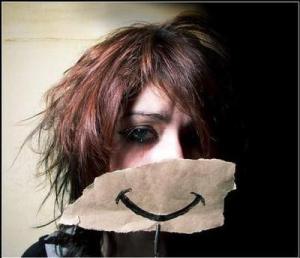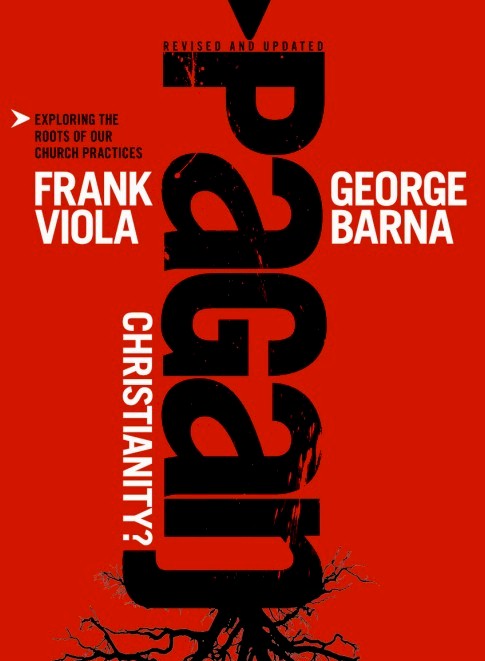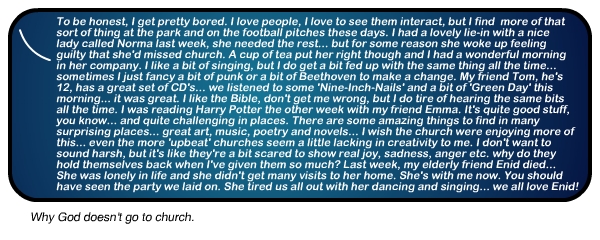In a previous post I introduced the idea that in some ways, church can be worse than porn. The reason is that while porn causes people to feel inadequate with their sex life, many churches cause people to feel inadequate about their spiritual life. Both are presenting a fantasy that does not match reality. Today, (with a head nod to Jeff Foxworthy) I want to present some signs that you might be in a fantasy church.
5 Signs you might be in a fantasy church

1. If everybody in your church seems happy, fulfilled, and satisfied all the time … you might be in a fantasy church. (Did you ever sing that “Happy, happy, happy all the time” song in Sunday school? Yeeeaaah …. nobody is truly happy, happy, happy all the time.)
2. If you are in a church where everybody seems to have devotions every day, their prayers are always answered in miraculous ways, and everybody seems to be talking about God all the time … you might be in a fantasy church.
3. If during the greeting time, someone asks you how you are doing, and when you answer “Terrible” they smile, nod their head, and say, “That’s nice,” … you might be in a fantasy church. (This actually happened to my wife!)
4. If you are in a church where people never seem to sin, have fights with their spouse, get speeding tickets, have trouble with lust or alcohol, or have questions and doubts about what the pastor preaches … you might be in a fantasy church.
5. If all you ever hear from the pulpit is how great it is to be a Christian, and how God will supply all your needs and take care of every problem … you might be in a fantasy church.
(If you can think of others, please post them in the comments below!)
If you find yourself in a fantasy church, beware!
Trying to be real and authentic in such a place will only get you hurt more deeply. The best thing a person can do who finds themselves in a fantasy church is to leave quietly and find a group of people with whom they can be authentic, open, and honest (even if they are not all Christians!).
One of favorite Christian music groups, Casting Crowns, has experienced this also, and sings about it in their song “Stained Glass Masquerade”:




 His argument was that if porn is wrong because porn is fantasy, then almost everything we read and watch and get involved in is wrong as well, because most of it is fantasy. Even the way most of us live our lives is fiction. We rarely let people see the inner hurt, pain, depression, frustration, fear, loneliness, and anger.
His argument was that if porn is wrong because porn is fantasy, then almost everything we read and watch and get involved in is wrong as well, because most of it is fantasy. Even the way most of us live our lives is fiction. We rarely let people see the inner hurt, pain, depression, frustration, fear, loneliness, and anger. Many churches are bigger fantasy playgrounds than the porn industry.
Many churches are bigger fantasy playgrounds than the porn industry.



 I read about this on the
I read about this on the 



 When I say “God is a stripper” I am reminded of a “looking for work” advertisement I saw in the newspaper a few years ago. At the top of the ad in big bold letters it said, “I’ll strip for you!” This ad was placed by a lady who owned a furniture stripping company. She was offering to strip and refinish your wood furniture. If you have ever tried to refinished your furniture, you know how valuable her services are. If I had to refinish the antique table my wife and I own, I would hire a stripper… a furniture stripper!
When I say “God is a stripper” I am reminded of a “looking for work” advertisement I saw in the newspaper a few years ago. At the top of the ad in big bold letters it said, “I’ll strip for you!” This ad was placed by a lady who owned a furniture stripping company. She was offering to strip and refinish your wood furniture. If you have ever tried to refinished your furniture, you know how valuable her services are. If I had to refinish the antique table my wife and I own, I would hire a stripper… a furniture stripper!

 For the past six weeks, I’ve had an all-out war with a family of squirrels. Sometime last fall, or over the winter, they decided to make our home their home.
For the past six weeks, I’ve had an all-out war with a family of squirrels. Sometime last fall, or over the winter, they decided to make our home their home.